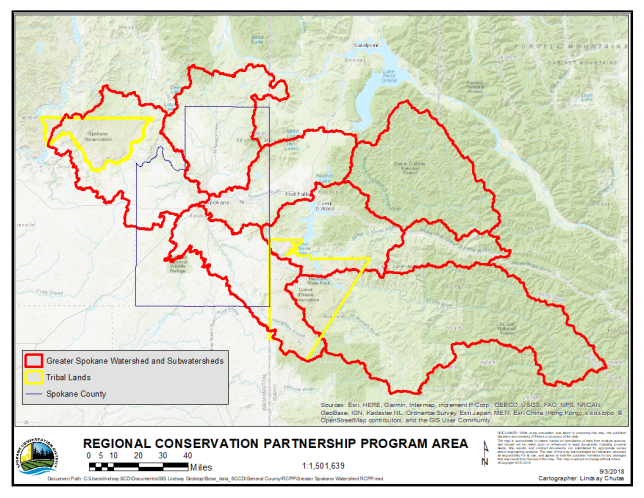Conservation funding producing both environmental and sustainable agriculture benefits

Thanks to investments in conservation tillage practices by farmers that began in 2017, 417, 481 tons of soil (the equivalent of about 30,000 fully loaded dump trucks) is no longer finding its way into Greater Spokane Watershed waterways. The resulting improvements provide cleaner and more abundant water, healthier soil, and enhanced wildlife and fish habitat.
These and other investments are made possible by the Spokane Conservation District (SCD) and several partners securing $7.7 million of funding from the U.S. Department of Agriculture for the Regional Conservation Partnership Program (RCPP). With partner matches and funding from the Washington State Conservation Commission, over 15.7 million dollars will be invested by the end of 2021.
Agricultural producers and private forest landowners across our 4-million-acre watershed are participating. Said Charlie Peterson, the SCD’s RCPP Program Manager, “In addition to broad-based environmental gains, we’re increasing the viability of agriculture by providing funding incentives and technical assistance that allow producers to install sustainable conservation practices.”
Chris Eckhart, who owns and operates a third-generation family farm with his wife in the Deer Park area, received RCPP funding to shift part of their 1,500-acre farm to no-till and mulch-till conservation practices. Said Eckhart, “We mostly produce wheat and have been mixing in canola, alfalfa, and grass hay. The RCPP cost share mitigated the risk of converting to no till, an expensive process with new equipment and doing things differently.”
RCPP, continued Eckhart, “fits with teaching our kids and others the importance of being mindful of what’s going on with the soil.” He points to the various microclimates and soil types across their 1,500 farm. “It’s not a one size fits all for soil health and keeping things economically viable. That’s why we’re mixing and rotating annual and perennial crops, using no-till where it makes the most sense, and taking advantage of the commodity buffer program.”
Summary numbers for the first three years of project activity are impressive:
- 125,154 acres of farmland in contract to utilize improved conservation tillage practices
- 3,488 acres of forest stand improvements. This includes thinning and pruning that improves forest health and reduces fire risks.
- 16,058 acres adopting precision agriculture practices. Farmers are going high-tech with GPS, satellite technology and advanced software to be far more precise about the amount, timing and location of practices such as applying fertilizer.
- 104 miles of commodity buffers installed. Here, farmers are generously compensated for taking out some of their most productive lands adjacent to waterways and replacing them with buffers, which are generally grass filter strips. By doing this, water quality and habitat are improved by keeping soil and nutrients out of waterways. Research indicates these buffers can hold back between 60 to 85 percent of suspended solids, phosphorus and nitrogen that would otherwise enter streams and rivers.
- $ 5.67 million in federal funding of 206 applications. Matching contributions from partners has resulted in over $11.3 million dollars of investment.
The Commodity Buffer Program is a home-grown innovation that is being funded by the Washington State Conservation Commission. “It’s proven to be both popular and effective,” said Walt Edelen, the SCD’s Water Resources Manager. “This year we’ll reach the maximum amount of buffer acreage we can fund. There’s now a wait list of people that would like to participate.”
The last year of RCPP funding is 2021. This fall, the SCD will work with partners to apply for five additional years of funding. The goal is to continue leveraging RCPP dollars with initiatives like the Voluntary Stewardship Program and state clean water grants to make a difference one acre and stream mile at a time.
Said Edelen, “We all want clean water that’s swimmable and fishable. At the same time, we value our agricultural community and heritage. Through RCPP and other initiatives, we are aggressively trying to support both.”
